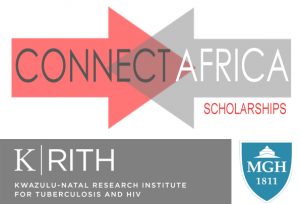
Budding African scientists have an exciting new avenue through which they can enhance their research careers and further equip themselves to tackle the scientific challenges of our times, including two of the world’s most daunting public health challenges: TB and HIV.

This week the KwaZulu-Natal Research Institute for TB and HIV (K-RITH), Massachusetts General Hospital (MGH) and the Ragon Institute of Mass General, MIT, and Harvard launched the Connect Africa Scholarship Programme. The Scholarships are aimed at offering young African scientists the chance to further develop as researchers by providing travel grants that facilitate opportunities for international exposure, learning new techniques, attending conferences and scientific courses, taking part in teaching opportunities, building new scientific research collaborations, and developing global and intra-Africa partnerships.
“This is a very exciting development” said K-RITH Education and Training Director, Dr Victoria Kasprowicz. “Young African scientists typically do not have the same opportunities to access the latest research tools and technologies or build cross-country networks with other scientists in the same field, or other fields, as do their counterparts in the West. Connect Africa Scholarships aim to provide personal development opportunities for African Scientists in training, and foster new collaborations, that they might otherwise have been unable to access.”
Vice Chancellor of the University of KwaZulu-Natal, Professor Malegapuru William Makgoba said of Connect Africa Scholarships “This programme not only addresses the future of African scientists and leadership; it is also about ‘brain retention and brain gain’ that Africa has lost over the years. It will change and impact the landscape of African science in HIV and TB research profoundly.”
The new scholarships programme aims to offer 90 awards of up to $2000 each over a 5-year period. It includes two types of awards: The Intra-Africa Awards, which are open to young African scientists who wish to travel to K-RITH, and affiliated sites in KwaZulu-Natal (and vice versa). And the Intercontinental Awards, which allow for young African scientists based at K-RITH and affiliated sites to travel outside of Africa. The awards are generously supported by a $200,000 USD donation from Massachusetts General Hospital and through philanthropic support from the Mark and Lisa Schwartz Foundation through the Ragon Institute of Mass General, MIT, and Harvard.
“MGH’s support of the new Connect Africa Scholarships program reflects the hospital’s deep commitment to empowering and encouraging young scientists in developing countries.” says Peter L. Slavin, MD, president of Massachusetts General Hospital. “It is my great hope that the benefits of these scholarships, especially as they relate to conquering the greatest scourge on the African continent – the HIV/AIDS problem – will be far-reaching and long-lasting.”
Dr Marylyn Addo, Director of International Programs at the Ragon Institute of Mass General, MIT, and Harvard agreed, adding “We hope that the funding opportunities through Connect Africa Scholarships will build useful capacity for training and research for young African scientists and will contribute to making K-RITH with its cutting edge tools and technologies an accessible and valuable resource and ‘hub’ for science and research education within the African continent.”
As one of the areas most heavily burdened by the epidemics of TB and HIV, KwaZulu-Natal is a focal point for TB and HIV researchers across the world. The newly established K-RITH Institute, is at the very heart of UKZN’s Nelson R. Mandela School of Medicine campus aims to conduct outstanding basic science and clinical research on TB and HIV and translate the scientific findings into new tools to control these public health problems. K-RITH specifically supports new and understudied research areas including bioinformatics, genomics, proteomics and lipidomics.
This collaboration also includes the HIV Pathogenesis Programme (HPP) and the Center for AIDS Programme of Research in South Africa (CAPRISA) and the University of KwaZulu-Natal (UKZN). HPP has become a world recognized research institute in the fields of HIV virology and immunology. In addition, CAPRISA, also based on the UKZN campus has a strong and impressive research history in HIV epidemiology, clinical trials, and most recently microbicide research. Together these research sites and UKZN house world-class TB and HIV researchers as well as state-of-the-art laboratories, including BSL-2 and BSL-3 laboratories (including an animal BSL-3 facility) and research equipment. In this context KwaZulu-Natal makes a logical pivot point for the Connect Africa scholarships.
“These scholarships will tremendously leverage the investments made in this new Institute. This kind of catalytic support is simply transformational,” said Dr. Bruce Walker, Director of the Ragon Institute of Mass General, MIT, and Harvard.
“We need to do everything we can to bolster the next generation of African scientists and give them the best chance possible to contribute towards solving these global problems whose greatest impact is right on their doorstep” says Director of K-RITH, Dr. William Bishai. “Our goal is to enable each individual to develop to their full potential and to support these young scientists as they progress to becoming independent researchers. We hope that these grants will lead to new collaborations and hopefully the strengthening of global and intra-Africa partnerships.”
Scholarships will be available for undergraduates, postgraduates, post-doctoral researchers and junior faculty. Applications will be accepted from 1 March 2013. For more information please visit either Connect Africa, Ragon or Connect Africa, K-RITH.